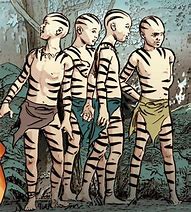SMART SEARCH







The Children of the Sun-2
Africa
A little more than a century ago a Frenchman by the name of Volney wrote an eloquent book entitled, "Ruins of Empires," it so delighted the scholars of the day that it was translated into English and a special edition sent across the Atlantic, to be known as the American sdition. The translator, out of respect to the feelings of Americans respecting the black races, let out the following quotation: "There are people, now forgotten, discovered, while others were yet barbarians, the elements of the arts and sciences. A race of men ejected from society for their sable skin and frizzled hair founded, on the study of the laws of nature, those civil aand religious systems which still govern the universe."
The excavation carried on under the supervision of the Pennsylvania University are located in the regions of lower Nubia and in the neighborhood of the ancient seat of the great Empire of Ethopia. Tradition has it that Ethopia is the mother of the nations and that she nourished and reared not only Egypt, but many of the nations of Asia and even gave to Greece her Gods, laws and civilization.
In spite of the fact that Ridpath (whose publishers admit that he is a popular historian and not an accurate one)classifies the Ethhiopians as white, it seems that their very name is Greek for "the dusky faced one," and the phrase, " to wash the Ethopians white," was a proverbial expression applied by the ancients to a hopeless task. The Hebraical verse, "Can the Ethopians change his skin or the leopard his spots?" is yet another verification of the fact that the Ethopians of six thousand years ago were the same as the Ethopians of today. Greece seems to have had a respect for the Ethopians that amounted to almost reverence. To them Ethopia was the home of the divine people, and from Ethopia came their great god Zeus. Of them Homer sings:
"The sire of gods and all the ethereal train,
On the warm limits of the farthest main,
Now mix with mortals, nor distain to grace
The feasts of Ethopia's blameless race."--(Illiad.)
It has been written that "when the Greeks knew scarcely of Italy or Sicily by name, the virtues, the civilization and the mythology of the Ethopian supplied their poets a subject of lofty description." Diodorus tells us that they were the inventors of pomps, sacrifices, solemn assemblies and of all honors paid the gods. Herodotus accounted them as a wonderful race and the Hebrews paid them lofty tribute in their scriptures. A very close relationship existed between the Egyptians and the Ethopians. It is nowhere asserted that they spoke the same language, but this seems implied and very probable in view of the fact that their nieroglyphics are the same.
In religion their relationship was even more pronounced. Both had the same system of worship, the same sacredotal orders, the same pomps and processions. The images of the gods were at certain times conveyed up the Nile from their Egyptian temples to others in Ethopia and after the festival were brought back again into Egypt. Many times in the history of Egypt the country swayed under Ethopian dynasties.
Reference:The Children of the Sun:George Wells Parker .....Read More
No thoughts on “The Children of the Sun-2”
Who's On Line?
We have 58 guests and no members online
Articles - Most Read
- Home
- LIVER DIS-EASE AND GALL BLADDER DIS-EASE
- African Wholistics - Medicines, Machines and Ignorance
- African Wholistics -The Overlooked Revolution
- African Holistics - Seduced by Ignorance and Research
- Want to slash the risk of dementia by a third? Sort out your hearing!
- Advertising
- Steroids are life-saving for critically ill COVID-19 patients, WHO says
- Mark Hoppus has stage 4 lymphoma
- 45-year-old woman damages liver from drinking herbal brew - dangerous 'side effects' Story by Solen Le Net •
- Women's Sex Organ Related Dis-eases ( Herpes, V.D., Etc.)
- The health problem plaguing female Olympians as 'pee flies through air' during competition
- Four types of freshwater fish 'globally' associated with rhabdomyolysis - study warning
- Okra: Nutrition tips from experts
- Do Yams Have Carbohydrates?
- Quickly Drain You Lymph System Using Theses Simple Techniques to Boost Immunity and Remove Toxins
Articles - Latest
- 6 Things to Try When You Can’t Sleep
- The Male G Spot Is Real—and It's the Secret to an Unbelievable Orgasm
- Herbs for Parasitic Infections
- Vaginal Care - From Pubes to Lubes: 8 Ways to Keep Your Vagina Happy
- 5 Negative Side Effects Of Anal Sex
- Cartilage comfort - Natural Solutions
- Top 5 health benefits of quinoa
- Quickly Drain You Lymph System Using Theses Simple Techniques to Boost Immunity and Remove Toxins
- Do Yams Have Carbohydrates?
- 45-year-old woman damages liver from drinking herbal brew - dangerous 'side effects' Story by Solen Le Net •
- Four types of freshwater fish 'globally' associated with rhabdomyolysis - study warning
- Okra: Nutrition tips from experts
- Advertising
- The health problem plaguing female Olympians as 'pee flies through air' during competition
- Women's Sex Organ Related Dis-eases ( Herpes, V.D., Etc.)
- Mark Hoppus has stage 4 lymphoma
- Steroids are life-saving for critically ill COVID-19 patients, WHO says
- Want to slash the risk of dementia by a third? Sort out your hearing!

